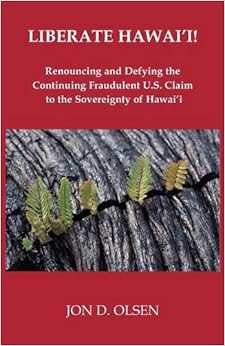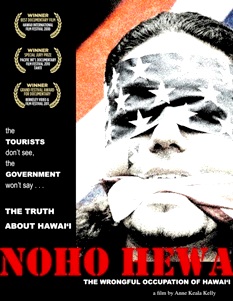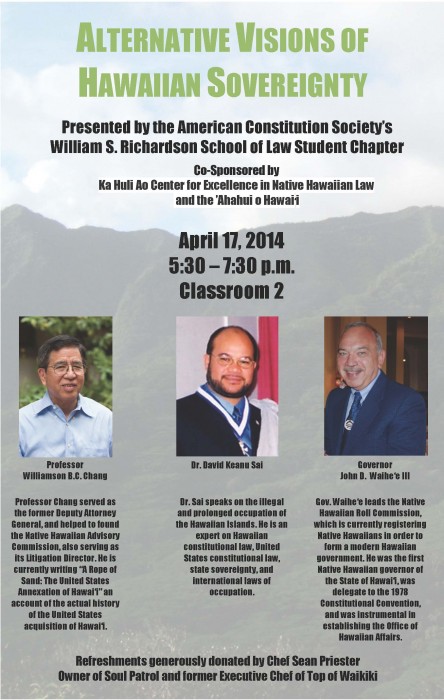Indian Country Today has an article about Dr. Sai’s international work, from his several recent presentations at universities in the Northeast.
|
||||||
|
Alternative Views of Hawaiian Sovereignty; Richardson Law School from Scott Wong on Vimeo. Dr. Keanu Sai, Prof. Williamson Chang and Former Governor now Roll Commission Chair John Waihe'e III Speak about their Ideas and research on the Alternative positions on Hawaiian Sovereignty for todays people. Press ReleaseLiberate Hawai’i! Rousing New Book Documenting Hawai’i’s Claim to Sovereignty From self-described “sixties radical” Jon Olsen, this complex yet elegantly written book is an entertaining, focused history of Hawai’I and the little-known facts of the United States’ claim to the country. Beginning in 1887 with the “Bayonet Constitution” and sweeping readers into the present day, ‘Liberate Hawai’i!’ is an important contribution to the continued fervour of the Hawaiian Resistance. From self-described “sixties radical” Jon Olsen, this complex yet elegantly written book is an entertaining, focused history of Hawai’I and the little-known facts of the United States’ claim to the country. Beginning in 1887 with the “Bayonet Constitution” and sweeping readers into the present day, ‘Liberate Hawai’i!’ is an important contribution to the continued fervour of the Hawaiian Resistance.Jefferson, ME — (SBWIRE) — 04/21/2014 — “Are you crazy?” That’s a question that Jon Olsen expects to hear upon release of his provocative and truth-telling new book, ‘Liberate Hawai’i!’ which boldly asserts that Hawai’i is not now, nor ever has been “part of” the United States. While offering carefully researched and fact-driven arguments for Hawai’i’s claim to sovereignty and his derision toward the United States’ arrogance for what Olsen demonstrates with documentation: their “occupation” of Hawai’i, Olsen realizes that his book may be contentious. “I just smile,” says the author, who lived in Hawai’i for over 36 years. “All I ask is that people keep an open mind as I make my main assertion – that the United States, to this very day, has no valid claim to the nation of Hawai’i. Due to false education, people have bought into this ‘whopper’ from the U.S. government, and to many, the notion that there might be contemporary Hawaiian resistance to the empire seems ridiculous. I urge readers to take a second look and challenge their own assumptions.” Continue reading Liberate Hawai’i! New Book Documenting Hawai’i’s Claim to Sovereignty
‘Noho Hewa’, with Anne Keala Kelly Native Hawaiian filmmaker, Anne Keala Kelly, will be in Aotearoa for two screenings of the award winning documentary Noho Hewa: the wrongful occupation of Hawai’i, a powerful portrayal of the multiple links between militarisation and the historical and ongoing processes of colonisation – in Auckland on Friday, 25 April, and in Wellington on Friday, 2 May. Please go to this page for information about ‘Noho Hewa’ and Ms Kelly, event details and contact information. The next installment of Sovereignty Conversations is being taped at ‘Olelo Studios in Mapunapuna this Saturday, April 19 from 1-3 PM, and cable-cast next week Friday APRIL 25, 7-8:30 PM on ʻOlelo Channel 53. For details contact: Dr. Kioni Dudley <DrKioniDudley@hawaii.rr.com> April 11, 2014. Lots of mana’o to consider here… Presentations: Afternoon Q&A panel: Mahalo to Pono for the videos. Interesting take in MANA magazine about the “Lind-Perkins debate” and the broader dialog happening in the Hawaiian community and social media about the Roll Commission and Hawaiian governance generally.
One example is the MAMUA Facebook page “dedicated to providing a neutral and informed forum on Hawaiian governance issues.” The article quotes Perkins’ sentiment that, “These types of debates were common during the heyday of Hawaiian newspapers in the nineteenth century,” and conclude:
Long-time readers of this blog will know that we have had some pretty good debates here in the past (in the old format, and before I shut down the comments for a while because they just became too much for me to manage). They were often heated but still within the bounds of civil discourse (although keeping them in bounds was what took so much to manage!). We’ve been carrying on the legacy of the old Hawaiian newspapers here on this blog, on many other blogs, on various email lists, and other online forums for many years. But it was often probably only the most engaged folks who were involved in these debates. Now with the combination of the Roll Commission activity bringing the issue to broader attention and implication, and the role of Facebook in facilitating the sharing of information and commentary, the debate is just reaching people now who perhaps weren’t engaged in the various online dialogs before, but realize that it matters to them and they do have choices to make. It is a continuous process of expanding levels of awareness and engagement. But that has always been the premise of this blog. Information is good. Education is good. Knowledge is good. Discussion is good. Then people can make up their own informed minds. This is the basis of a healthy democracy, regardless of what national political system it is happening within. Edit: A note on semantics. Even the terms we use to debate are loaded, and how much we’ve been involved in the debate will largely determine how aware we are of the meaning and connotations for various terms. In this case, “governance” is used by the article and I use it myself, for in a general sense it is appropriate to talk about, but at the same time it is important to realize that this term in some contexts is also code for internal, domestic, native, something short of actual sovereign government. And the term “nation-buliding process” — first off, “nation” again implies internal, domestic, not a state/country, and the “building process” implies that it is not already in existence, contrary to what those who study the history often come to believe. I fall into using terms for convenience sometimes, but it is worth noting that even the terms we use for the debate can frame or limit the scope of the debate, and we are wise to choose our words carefully to accurate reflect history, law and what we mean to say. The Color of NationalityContinuities and Discontinuities of Citizenship in Hawaii
Dr. Willy Kauai Department of Political Science University of Hawaii at Manoa
First in a series of presentations on new research into Hawaiian Kingdom history Olelo Community Media Center · 1122 Mapunapuna St. April 19, Saturday, 5:30 pm Sponsored by Ka Lei Maile Alii Hawaiian Civic Club and the Office of Hawaiian Affairs Ample parking in the Olelo Community Media Center parking lot and on the street For more information: palolo@hawaii.rr.com, phone (808) 284-3460 Seating is limited This event is free and open to the public The Moscow Times cites the Russian government’s use of the Hawai’i example as a “flawed ‘look who’s talking’ argument to counter criticism of its annexation of Crimea.”
(h/t to FreeHawaii.info for finding this.) |
||||||
|
Copyright © 2026 Hawaiian Kingdom Independence Blog - All Rights Reserved Powered by WordPress & Atahualpa |
||||||



